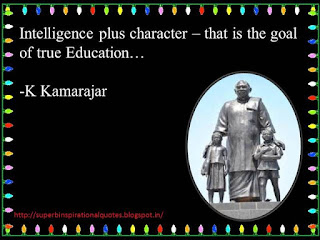KAMARAJAR CONTRIBUTION TOWARDS EDUCATION
Kumarasami Kamaraj Born July 15th 1903 in Virudhunagar was a well-known Indian political leader, freedom fighter and former chief minister of Tamil Nadu. The nation widely acknowledged him as the “KINGMAKER” in Indian politics (during the 1960s). He was referred as “Kamarajar”, “Perunthalaivar”,”Padikkatha methai” in tamilnadu. (Kamaraj, admired for his simplicity and integrity, had a long and illustrious political career as Member of Legislative Assembly from 1954 to 1967 and as Member of Parliament initially from 1952 to 1954 and then from 1969 to 1975. He also served as President of Tamil Nadu Congress from 1940 to 1954 and as President of All India Congress from 1963 to 1971.) Considering his contribution towards education his birth anniversary is been celebrated as “Educational Development day”. On occasion of this day I would like to emphasis few of his contribution towards education.
When Kamarajar came to power, he quickly realizes that Students were lacking with educational institutions. Illiteracy rate is much higher than the voters turn around. Illiterate parents were reluctant to send their children to school as they never felt the importance of education as he does. (Kamaraj was not a good student in school and dropped out when he was in the sixth grade. When he entered mainstream public life he felt handicapped and realized the importance of a good education. He educated himself during his periods of imprisonment and even learned English from his co-worker). All this made Kamarajar to take reform steps and made universal educational initiations. During his tenure as chief minister of Tamilnadu(then called Madras) (from April 13 1954 to 1963) introduced various reforms & revolutionized the education system. Here I am going to talk about 3 most important reforms of them.
1. Putting end to retrograde policies: During the tenure of Rajaji, nearly 6000 schools were closed citing financial constraints also introduced hereditary-based vocational education scheme which required students to learn the traditional caste occupation of their families. This scheme was strongly opposed from all political quarters and which made Rajaji resign as Chief Minister of Tamilnadu. Following which, Kamaraj was chosen to be the Chief Minister by the Congress Party. He took the responsibility and went about rectifying the education system. Putting an end to retrograde policies such as the hereditary-based vocational education scheme, Kamaraj also reopened 6,000 schools that were previously closed and opened 12,000 more new schools. Those efforts were taken to start schools in almost every village with a population of over 300. (Realizing the importance of the mother tongue, Kamaraj took steps to introduce Tamil as medium of instruction in schools and government arts colleges, publish textbooks on scientific and technical subjects in Tamil, encourage use of Tamil in courts of law and use Tamil typewriters in government offices.)
2. Free Education and uniforms: Kamaraj took charge to eradicate/remove illiteracy in state by introducing free and compulsory education up to eleventh standard. The Government provided exemption of school fees to poor children and also introduced and provided uniforms to weed out caste, creed and class distinction among the young minds.
3. Midday Meal Scheme: The most revolutionary change initiated by Kamaraj was the introduction of the Midday Meal scheme, through which primary school children were provided with one meal in panchayat and government-run schools.(It is said this scheme was inspired by an incident which took place when Kamaraj was at a train intersection near the town of Cheranmahadevi in Tirunelveli district of Tamil Nadu. Kamaraj, while waiting for the train to cross, noticed young boys tending to their goats and cattle. He asked one small boy, “What are you doing with the cows? Why didn’t you go to school?”. The boy immediately answered, “If I go to school, will you give me food to eat? I can learn only if I eat.” The boy’s casual yet insightful response triggered the entire process into establishing the Midday Meal Scheme.) The scheme was officially launched in 1956 with the twin objectives of increasing enrolment of students from all mass and reducing drop-out of students from schools. (It is believed to be the first such Government initiative anywhere in the world to provide lunch at schools. Such heartening results inspired Dr Manmohan Singh, as the Union Minister of Finance in 1995, to suggest that the scheme be implemented all over India under the ‘National Programme for Nutrition Support to Primary Education ‘In Tamil Nadu, the scheme has undergone several changes such as the inclusion of eggs and vitamin tablets to improve the nutritional value of the meals.) (Though it is difficult to measure the success of the Midday Meal Scheme in isolation, its contribution to reduction of drop-out rates, increasing enrolment and improving nutritional status of children is beyond doubt.)
Conclusion: Virtue of all his efforts and policy, during the tenure of Kamaraj, the percentage of school going children in the age group of 6 to 11 years increased from 45% to 75%. Boosted up the literacy rate from 7% to over 38% in Tamil Nadu region. It was considered as the first steps taken towards the universalization of primary education by any government in India. The Midday Meal Scheme has been enhanced by successive governments and has now been adopted across the country. Contribution of Kamarajar to educational field made the villages to have at least the primary education (P.E).
He breathed his laws on October 2, 1975. In1976, posthumously he was honored with "Bharat Ratna" by the government of India.
The golden words of Kamarajar to the young students are, ' Face the problem don't evade it, find the solution for the problem'.


0 comments:
Post a Comment